How to Conduct a Microsoft Cloud Background Check
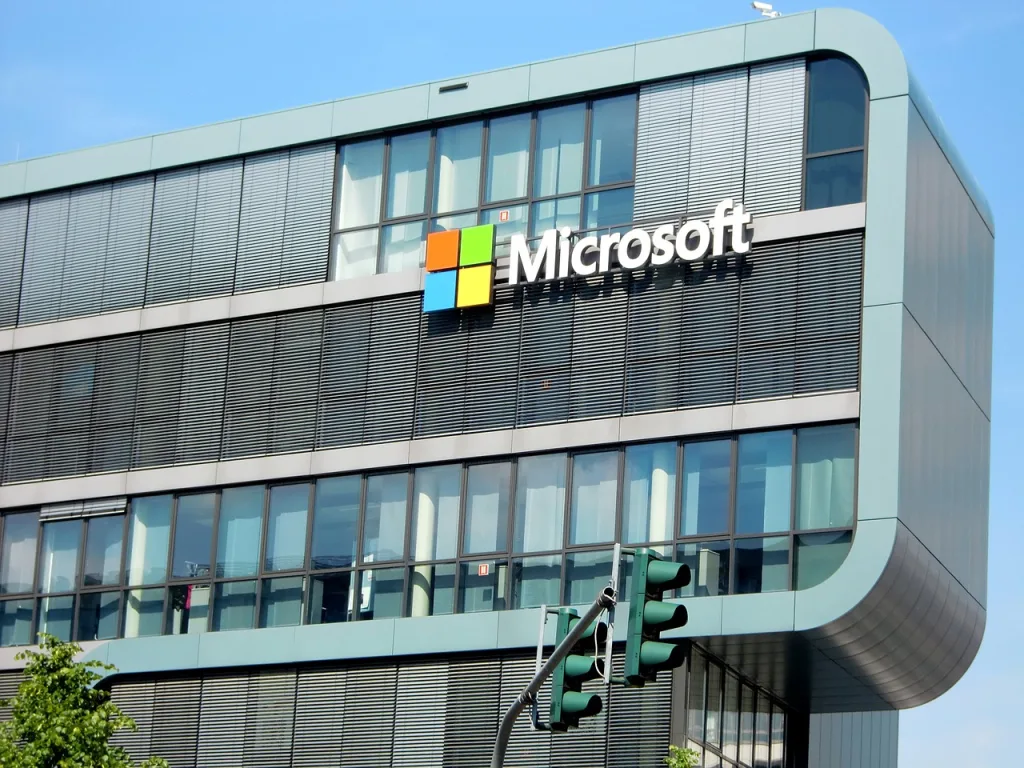
Introduction & Overview of Microsoft Cloud Background Checks
In today’s rapidly evolving digital landscape, cloud services are an integral part of businesses and everyday life. With cloud-based solutions such as Microsoft Azure, Microsoft 365, and other enterprise offerings, organizations can store, manage, and access data remotely, providing flexibility and scalability. However, with the vast amount of sensitive information being stored and processed in the cloud, security and trust become paramount. This is why Microsoft and other cloud-based companies require stringent background checks for their employees and contractors, ensuring they meet the necessary security and trust standards.
What is a Microsoft Cloud Background Check?
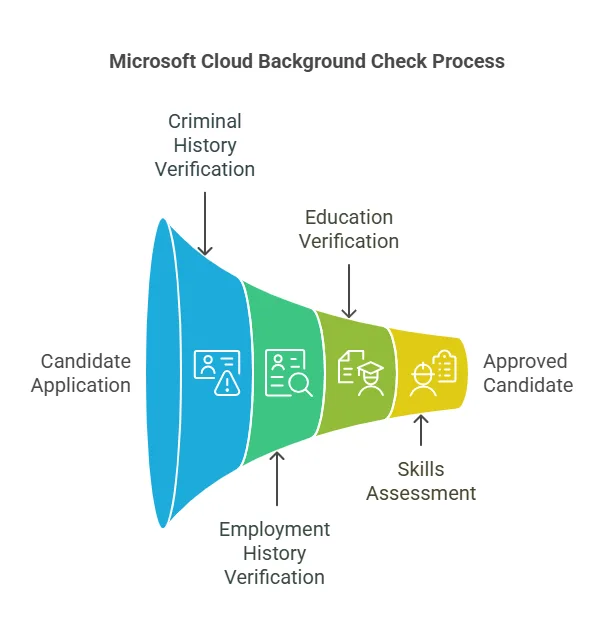
A Microsoft Cloud background check refers to the process Microsoft undertakes to evaluate an individual’s history and qualifications before hiring them or granting access to their cloud-based platforms. It is a thorough screening process designed to ensure that employees, contractors, and third-party vendors do not pose a risk to the security and integrity of Microsoft’s cloud services, user data, and enterprise resources.
The background check process typically involves verifying an individual’s criminal history, employment history, education, and other factors related to their qualifications for working in cloud-based environments. In addition, Microsoft also assesses the cybersecurity skills and technical knowledge of candidates, which is especially important in an environment where sensitive data is stored and transmitted online.
Why Microsoft or Cloud-Based Companies Require Background Checks
Microsoft, along with many other cloud-based companies, understands the importance of building a strong security infrastructure. The nature of cloud services requires trust between the company, its employees, and its clients. A single breach in security can have catastrophic consequences, including the exposure of confidential customer data, intellectual property theft, and damage to the company’s reputation. Therefore, it is crucial for Microsoft to ensure that every individual working with cloud services is trustworthy, skilled, and capable of upholding the company’s high standards of security.
1. Data Protection and Security
As the custodian of large amounts of sensitive data—ranging from personal information and financial records to intellectual property—Microsoft needs to ensure that its employees and contractors are well-vetted. A cloud environment relies heavily on individuals who understand cybersecurity protocols and data protection laws. Without a comprehensive background check, companies could unintentionally hire individuals with a history of fraud, cyberattacks, or data mishandling. By ensuring that their cloud professionals have clean records and robust security knowledge, Microsoft aims to protect its customers’ data from unauthorized access or malicious threats.
2. Trust and Integrity
Trust is an essential element when it comes to cloud-based services. Companies like Microsoft have established themselves as reliable and secure platforms, meaning that the employees they hire must uphold these values. Background checks are one way to ensure that employees and contractors possess a history of ethical behavior and professionalism. This is especially true for individuals who will have access to sensitive data, internal networks, or other critical systems. Microsoft wants to ensure that those managing cloud resources have a reputation for integrity and honesty.
3. Compliance with Industry Standards
Cloud service providers, including Microsoft, must comply with a wide range of industry standards and regulations. These include frameworks like the General Data Protection Regulation (GDPR) in Europe, the Health Insurance Portability and Accountability Act (HIPAA) in the U.S., and the Federal Risk and Authorization Management Program (FedRAMP) for government contracts. Background checks are part of this compliance process. Microsoft must ensure that all individuals working on their cloud systems meet the regulatory requirements to protect user data and privacy.
Key Factors in Background Checks for Cloud-Based Roles
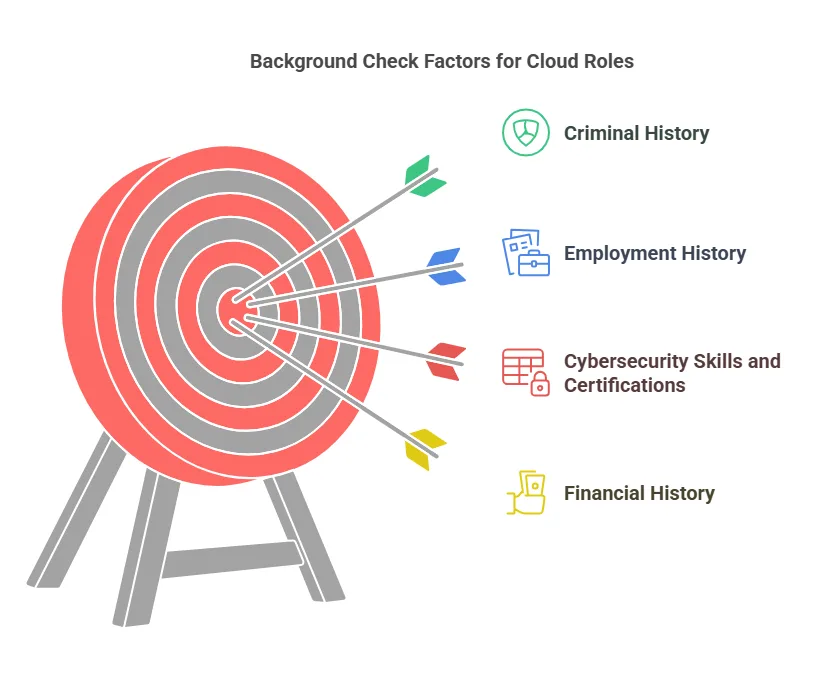
When conducting a Microsoft Cloud background check, there are several key factors that Microsoft and similar cloud-based companies focus on. These elements help determine whether an individual is qualified, reliable, and capable of safeguarding sensitive information and ensuring the security of the organization’s cloud environment.
1. Criminal History
One of the most critical components of any background check is an individual’s criminal history. For Microsoft, individuals applying for cloud-related roles are typically subjected to a criminal background check. This ensures that candidates have no history of engaging in illegal activities such as fraud, hacking, data theft, or other crimes that would jeopardize the integrity of cloud systems.
A clean criminal history helps reduce the risk of hiring someone who may have a hidden agenda or prior involvement in illegal activities. Additionally, certain jurisdictions may have specific regulations regarding the types of criminal convictions that can be considered when hiring individuals in sensitive roles.
2. Employment History
Verifying a candidate’s employment history is an essential part of any background check. Microsoft is particularly focused on ensuring that candidates have prior experience in cloud computing, IT security, or other related fields. Previous experience working with cloud platforms such as Microsoft Azure, AWS, or Google Cloud can be an indicator of a candidate’s ability to work within a similar environment at Microsoft.
Furthermore, examining employment history also provides insight into a candidate’s job stability, career growth, and performance in prior roles. This is especially crucial in cloud roles, where technical expertise and problem-solving abilities are paramount.
3. Cybersecurity Skills and Certifications
Microsoft, being a leader in the cloud services industry, places a high premium on cybersecurity skills. As part of the background check, candidates for cloud-based roles are often required to demonstrate their proficiency in cybersecurity protocols, threat detection, and data protection measures. This can be done through certifications like Certified Information Systems Security Professional (CISSP), Certified Cloud Security Professional (CCSP), or other industry-recognized qualifications.
The ability to secure data, detect vulnerabilities, and prevent cyberattacks is essential for anyone working with Microsoft’s cloud services, particularly in roles involving access to highly sensitive information.
4. Financial History
While not always part of every cloud background check, a candidate’s financial history may be reviewed, especially for roles that involve handling customer data or sensitive financial information. This could include checking for past bankruptcies, outstanding debts, or a history of financial mismanagement, as such behaviors could indicate potential risks to the company’s security or integrity.
How Microsoft Conducts Cloud Background Checks
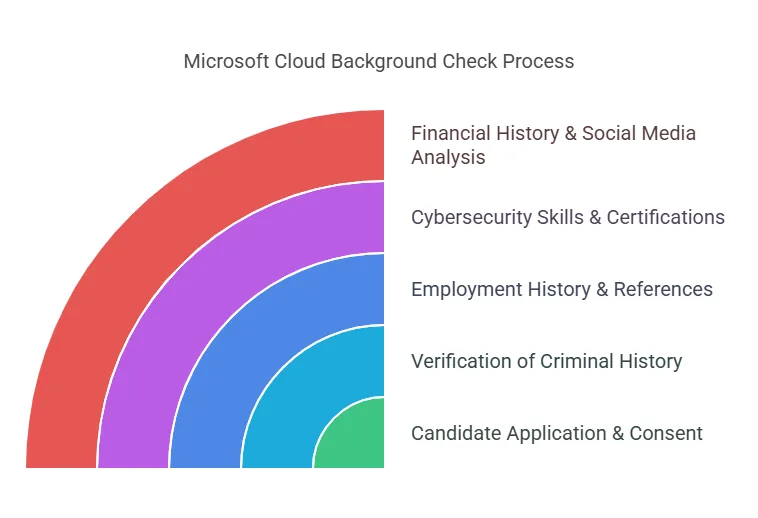
Microsoft, as a leading cloud services provider, takes a thorough and systematic approach to background checks for its employees, contractors, and vendors involved in cloud-related roles. These checks are an integral part of ensuring that anyone who interacts with or manages cloud-based systems adheres to the company’s standards of security, ethics, and professionalism.
1. Candidate Application & Consent
The background check process typically begins when a candidate applies for a position at Microsoft, whether it’s for a full-time role, a contractor position, or a third-party service engagement. As part of the application process, candidates are asked to provide explicit consent to undergo a background check. This consent is usually obtained through a signed agreement or form that outlines the scope of the check.
By obtaining consent, Microsoft ensures compliance with laws such as the Fair Credit Reporting Act (FCRA) in the U.S., which governs the use of background check information in hiring decisions. This step also ensures that candidates are aware of the screening process and agree to the verification of their personal and professional history.
2. Verification of Criminal History
One of the first elements checked in a Microsoft Cloud background check is the criminal history of the candidate. Microsoft places a strong emphasis on hiring individuals who have a history of ethical behavior and who have not engaged in criminal activities that could pose a threat to data security.
Microsoft partners with third-party background check providers to access local, state, and national criminal databases, ensuring a comprehensive review of any criminal records that might be relevant to the role. Depending on the nature of the job, some roles may require additional checks, including:
- Felony convictions (particularly in areas related to fraud, hacking, or data breaches)
- Sexual offenses (for positions that involve working with vulnerable populations)
- Pending charges that might raise concerns about the candidate’s fitness for the role
It is important to note that Microsoft’s criminal background checks are conducted with respect to privacy laws, and candidates are given an opportunity to dispute any inaccuracies found during this process.
3. Employment History & References
Once the criminal history is verified, the next step involves checking the candidate’s employment history. Microsoft seeks candidates with relevant work experience, particularly in areas such as cloud computing, cybersecurity, and IT operations. This is essential for ensuring that candidates have the necessary technical expertise to contribute to the secure management of cloud services.
Microsoft’s employment verification process includes:
- Confirmation of previous employers and job titles
- Duration of employment and reasons for leaving
- Performance reviews (if available)
- Reference checks with former supervisors, colleagues, or industry peers to verify the candidate’s qualifications and work ethic
This information helps Microsoft assess the candidate’s qualifications and suitability for cloud roles, ensuring that they possess the right skills and background to handle sensitive data and infrastructure.
4. Cybersecurity Skills & Certifications
Given the highly sensitive nature of cloud computing, Microsoft places a significant emphasis on assessing the cybersecurity skills of its candidates. Cybersecurity expertise is critical to prevent breaches, data leaks, or any threats to the integrity of cloud platforms. Microsoft evaluates the technical qualifications of candidates through a combination of direct experience and industry-recognized certifications.
Key certifications that are commonly assessed in the Microsoft Cloud background check process include:
- Certified Information Systems Security Professional (CISSP): A globally recognized certification for cybersecurity professionals, demonstrating a strong understanding of security principles and practices.
- Certified Cloud Security Professional (CCSP): A certification that focuses on cloud-specific security practices and data protection strategies.
- Certified Information Security Manager (CISM): A certification designed for professionals managing an organization’s information security program.
- Microsoft Certified: Azure Security Engineer Associate: A certification that specifically validates the skills required to secure cloud platforms like Microsoft Azure.
These certifications demonstrate the candidate’s knowledge of how to protect data and prevent potential vulnerabilities in cloud services, ensuring that the individual can contribute to Microsoft’s commitment to security and compliance.
5. Financial History (If Applicable)
In some cases, especially for roles that involve managing sensitive financial data or making financial decisions, Microsoft may review a candidate’s financial history as part of the background check. Financial problems, such as bankruptcies, excessive debt, or poor credit history, can sometimes indicate potential risks related to integrity or financial mismanagement.
For candidates applying to roles with access to sensitive customer data or financial records, a review of financial history helps Microsoft assess any potential conflict of interest or risk of fraud. Microsoft also adheres to regulations like the Fair Debt Collection Practices Act (FDCPA) and other financial privacy laws when reviewing this type of data.
6. Social Media & Online Presence Analysis
Another increasingly important aspect of Microsoft Cloud background checks involves evaluating a candidate’s online presence. Microsoft, like many other companies, recognizes that social media and online behavior can reflect an individual’s character and professionalism. In some cases, the company may review publicly available information from platforms such as LinkedIn, Twitter, GitHub, and other professional or social networks to gain additional insights into the candidate’s behavior and expertise.
While Microsoft typically limits its focus to professional accounts (such as LinkedIn or GitHub), it is important to be aware of any publicly accessible content that could impact the company’s reputation or security standards. In particular, Microsoft looks for:
- Technical contributions in the form of blogs, articles, or open-source projects
- Professional networking and relationships with industry peers
- Online behavior that aligns with the company’s values of trust, respect, and professionalism
Microsoft aims to ensure that candidates have a strong, positive online presence that aligns with the company’s ethos and security standards.
Legal Aspects of Microsoft Cloud Background Checks
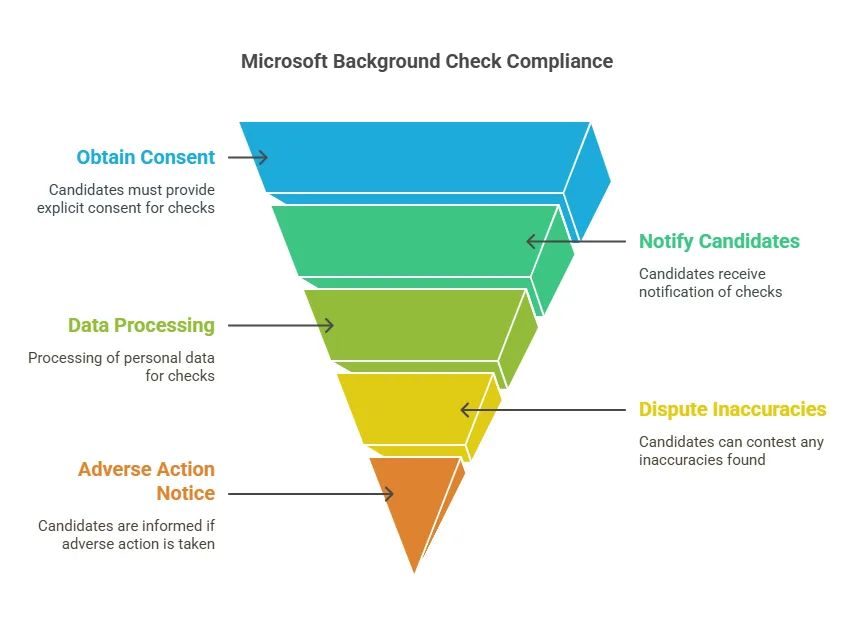
Microsoft, like other major companies, conducts background checks in compliance with a variety of legal frameworks, regulations, and best practices. These legal requirements are designed to protect the rights of candidates while ensuring that the background check process is fair, transparent, and non-discriminatory. The following are some of the key legal considerations when it comes to conducting background checks for cloud-based roles at Microsoft.
1. Fair Credit Reporting Act (FCRA)
The Fair Credit Reporting Act (FCRA) is a U.S. federal law that governs how background checks are conducted by employers and other organizations. Under the FCRA, companies like Microsoft are required to:
- Obtain consent from candidates before conducting a background check.
- Provide candidates with clear written notice that a background check will be conducted.
- Offer candidates the opportunity to dispute any inaccuracies found during the background check process.
- If an adverse action is taken based on the background check (such as not hiring the candidate), Microsoft must provide the candidate with a pre-adverse action notice, followed by an adverse action notice if the decision is finalized.
By adhering to the FCRA, Microsoft ensures that candidates’ rights are protected during the background screening process, and that any decision made based on a background check is fair and justified.
2. General Data Protection Regulation (GDPR)
For candidates located in the European Union (EU), Microsoft must comply with the General Data Protection Regulation (GDPR), which is a regulation designed to protect individuals’ personal data and privacy. The GDPR applies to all organizations operating within the EU and any company that processes the personal data of EU citizens, regardless of where the company is located.
When conducting background checks for cloud roles in the EU, Microsoft must:
- Obtain explicit consent from candidates before processing their personal data.
- Ensure that the personal data is used for legitimate purposes and is not retained longer than necessary.
- Allow candidates to access, correct, or delete their personal data if required.
The GDPR mandates that all organizations handling personal data, including Microsoft, maintain the highest standards of data protection and security, and background checks must be conducted in compliance with these requirements.
3. Equal Employment Opportunity (EEO) Laws
Microsoft, as an employer, must also adhere to Equal Employment Opportunity (EEO) laws, which prohibit discrimination based on race, color, religion, sex, national origin, age, disability, or genetic information. When conducting background checks, Microsoft must ensure that the process does not disproportionately impact certain groups or lead to discriminatory practices. For example, if a candidate has a criminal record, Microsoft must assess whether the record is relevant to the job and whether excluding the candidate based on this information is justified by the position’s responsibilities.
The EEOC guidelines on criminal background checks highlight the importance of ensuring that background check criteria are job-related and consistent with business necessity. This means that Microsoft must ensure their background checks are designed to protect security without discriminating against applicants based on their demographic characteristics.
4. Data Protection and Privacy Laws
In addition to the GDPR, Microsoft must comply with various data protection and privacy laws depending on the location of the candidate and the nature of the background check. This includes laws that govern the collection, storage, and sharing of personal data. Microsoft ensures that all candidate data is handled with the utmost care, ensuring that it is stored securely and only accessed by authorized personnel. Furthermore, Microsoft must ensure that the data collected during the background check process is used strictly for the purposes of employment screening and not shared with third parties without the candidate’s consent.
Frequently Asked Questions (FAQs)
What information is typically included in a Microsoft Cloud background check?
A Microsoft Cloud background check typically includes an assessment of:
- Criminal history (checking for any felony or misdemeanor convictions)
- Employment history (verifying previous employers and roles)
- Cybersecurity certifications and skills (assessing technical expertise in cloud security and IT)
- Financial history (in some cases, for roles handling sensitive financial data)
- Social media and online presence (reviewing publicly available professional information)
Can Microsoft deny employment based on a background check?
Yes, Microsoft can deny employment based on the findings of a background check, but only if the information is relevant to the position. For example, if a candidate’s criminal record involves crimes related to fraud or hacking, and the candidate is applying for a role that requires handling sensitive data, Microsoft may decide not to proceed with the hiring. However, candidates have the right to dispute any discrepancies found during the background check process.
Are background checks for Microsoft Cloud positions different from other roles at Microsoft?
Yes, the background check process for cloud-related roles at Microsoft is often more comprehensive due to the nature of the job. Employees and contractors working with cloud systems need to demonstrate technical expertise in areas such as cybersecurity, data protection, and cloud computing. Additionally, roles involving access to sensitive data require a higher level of scrutiny compared to other roles.
How long does the background check process take for Microsoft Cloud positions?
The length of the background check process can vary depending on the complexity of the check and the specific role. For Microsoft Cloud positions, the process can take anywhere from a few days to a few weeks, as it may involve multiple layers of verification, including employment history, criminal background checks, and cybersecurity certifications.
Can candidates with criminal records still be considered for Microsoft Cloud roles?
Yes, candidates with criminal records may still be considered for cloud-related roles at Microsoft, but it depends on the nature of the crime and the relevance to the role. Microsoft evaluates criminal records on a case-by-case basis, taking into account the severity of the offense, the time elapsed since the conviction, and whether the crime is relevant to the candidate’s ability to perform the job safely and securely.
Conclusion
In this article, we explored the importance of Microsoft Cloud background checks and how they are an essential component of maintaining security, trust, and compliance within the company’s cloud services. We examined the process of conducting background checks, including the verification of criminal history, employment history, cybersecurity skills, financial standing, and online presence. Additionally, we discussed the legal aspects surrounding these checks, including compliance with the Fair Credit Reporting Act (FCRA), GDPR, EEO laws, and other data protection regulations.
The Microsoft Cloud background check process is crucial to ensure that individuals working in cloud-related roles possess the right qualifications and maintain the integrity and security of the company’s cloud systems. By adhering to rigorous legal standards and conducting thorough background checks, Microsoft can ensure that its employees, contractors, and vendors are trustworthy, capable, and compliant with industry regulations.
